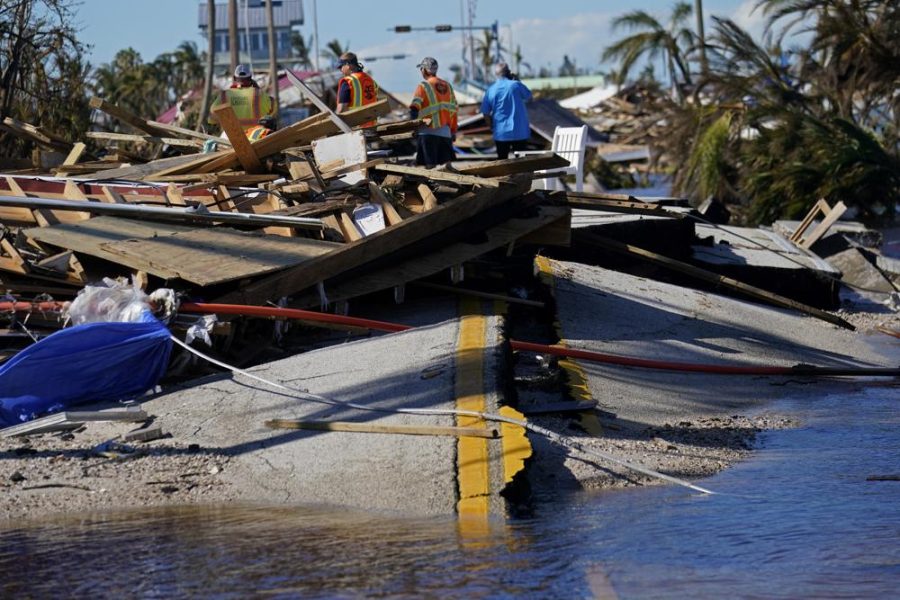Hurricane Ian Wreaks Havoc On Florida
Latest hurricane to hit Florida gives a peek into future climate disasters, shows a lack of preparedness by Florida’s government…again.
Responders from the de Moya Group survey damage to the bridge leading to Pine Island, to start building temporary access to the island in the aftermath of Hurricane Ian in Matlacha, Fla., Sunday, Oct. 2, 2022. The only bridge to the island is heavily damaged so it can only be reached by boat or air. (AP Photo/Gerald Herbert)
October 3, 2022
The latest natural disaster to strike the sunshine state wasn’t as lethal as previous hurricanes, but the fallout and damage control has been worse.
Weeks after Governor DeSantis’ $12,000,000 political stunt, Hurricane Ian landed in Fort Myers and reaffirmed climate scientists’ worries.
Ian made landfall as a Category 4 hurricane, and wasted no time completely decimating the city of Fort Myers with 150mph winds. Residents and evacuees alike are quickly realizing their former homes may be lost forever or, if they’re lucky, for many months.
Those living in heavily affected areas were given little time—as little as a day–to prepare and evacuate, likely adding to the list of reasons for high casualties being reported in places like Lee County. In addition, every one of Florida’s representatives voted nay on a relief aid bill for Sunshine State residents.
Floridians are no strangers to hurricanes and their potential havoc, but the state’s government has yet to implement the proper infrastructure in order to prevent worst-case scenarios like we’re currently seeing. To make matters worse, there has reportedly been a discrepancy between officially counted deaths and those counted by local rescuers.
As of the time of this writing, Florida officials reported approximately 70 deaths statewide due to Ian. In Fort Myers alone, rescuers have counted around 100 bodies resulting from the storm’s force. This past Sunday, Governor DeSantis defended officials’ decision to not order evacuations until 24 hours before Ian’s landfall.
In spite of forecasts and tracking technology predicting the landfall correctly, the governor doubled down on this sentiment. “Don’t forget: Sunday 11 A.M. advisory, it was gonna go to Taylor County in North Florida,” DeSantis said.
John Schneyer of CoreLogic—a property research firm—and his team have estimated that about 7.2 million homes were affected by Ian, with rebuilding efforts numbering around $1.6 trillion dollars.
Natural disasters are phenomena that are nearly impossible to prevent, but the technological capacities we have today can be used to face the brunt of them. Stronger power grids, well-established evacuation and information procedures, in addition to concise legislation surrounding climate change are some of the things that Floridians need from their legislators.
The homeowner market in Florida has taken a drastic hit in recent years due to the vulnerability of the state to hurricanes. Insurance companies have been pulling their services out of the state in order to avoid mass payouts.
Humans cannot control the weather, just as Floridians cannot control how their homes are damaged during hurricane season.
Insurance companies punishing residents of the sunshine state for their choice of home has gone unchecked for too long.
Aside from rescue and rebuilding efforts, Floridians should be actively putting pressure on their government officials en masse to better protect them—and their homes—during times of crises.


